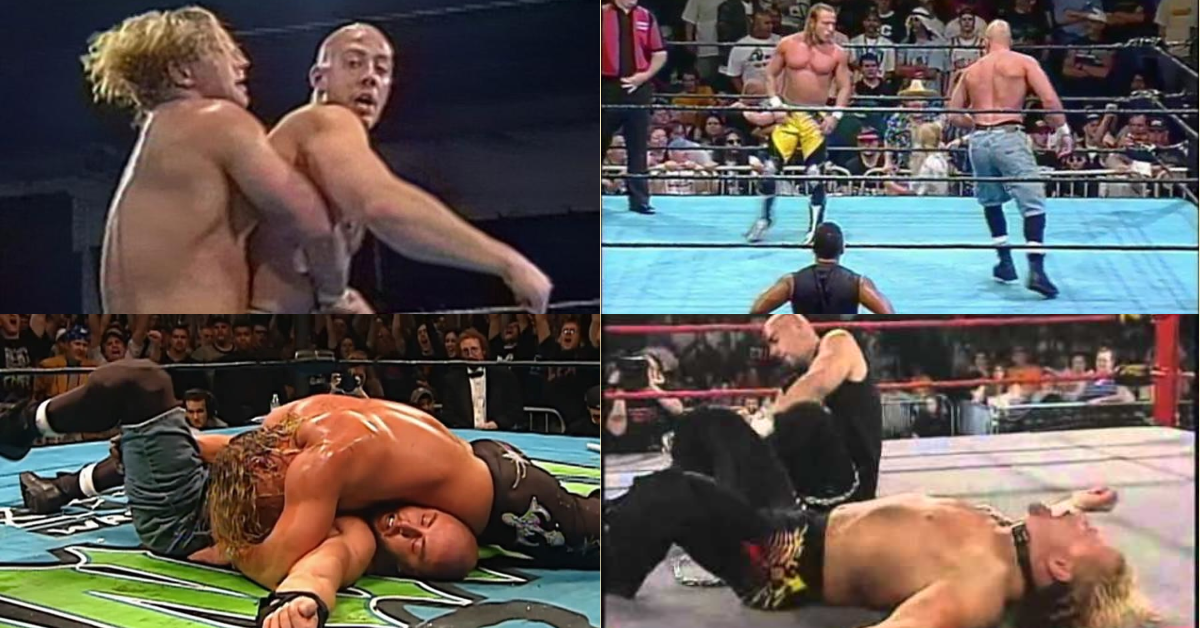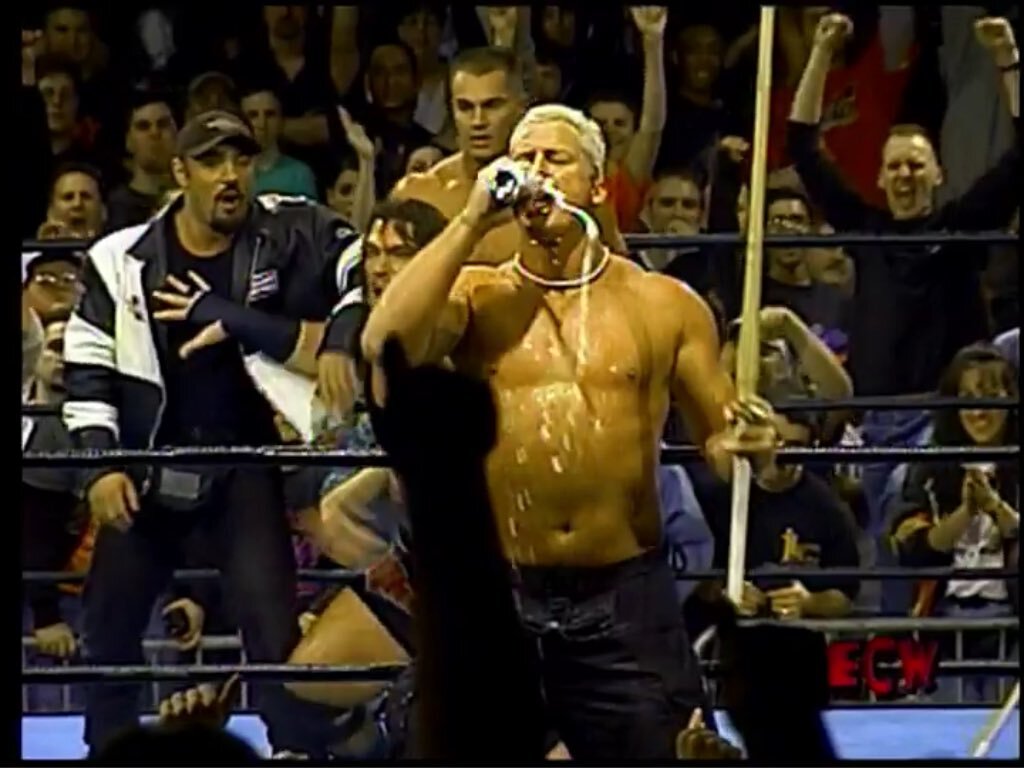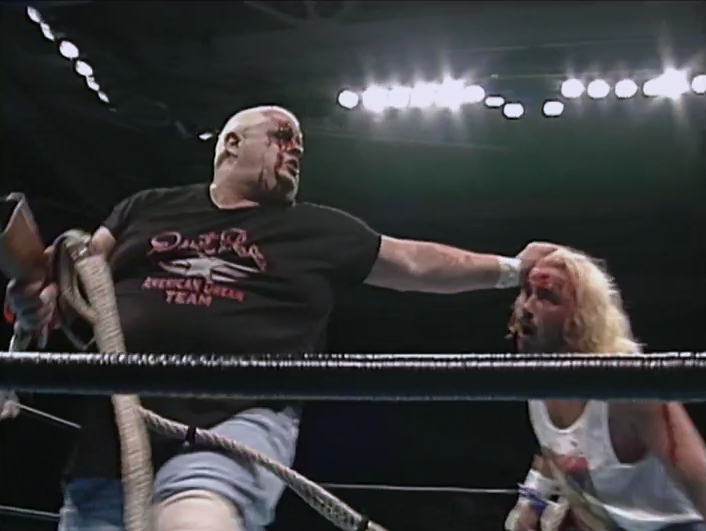The Transformation of Cactus Jack Into a Superstar
Cactus Jack was a crazed, unpredictable character who seemed to relish in the anguish he inflicted on his opponents and the pain he was forced to endure in the process. While far from the most athletic, Cactus was extraordinarily unique in a landscape full of chiselled giants and possessed unmatched tenacity.
In an article that he penned for Sports Illustrated, Foley would explain that the Cactus Jack character was created as a vehicle to build his confidence so he could eventually transition into a more desired persona:
Cactus Jack was supposed to be a generic, boring name for a 6-foot-4, 220 pound Long Islander big on heart, but lacking in athletic ability and the thick slabs of muscle which had become almost mandatory in the mat game by the mid-eighties. So when I was asked my name 31 Junes ago at the Clarksburg, West Virginia armory before the first match of my career, the name “Cactus Jack” just kind of came out. I only intended to be Cactus Jack long enough to learn the ropes and develop enough confidence to become the man I really thought I was destined to become–Dude Love, eye candy for the ladies, the object of so many women’s affections, that long ago he’d refused to count them all.
With his trainer Dominic DeNucci, Cactus Jack would enjoy tenures with AWA, WCCW, UWF, Tri-State Wrestling, and GWF. During his time with WCCW, he caught the attention of Terry Funk, who would note that he was immediately drawn to the wild talent known as Cactus Jack due to being so unusual and different.
Mick believes he accomplished this by suspending the audience’s disbelief.
“I was doing some wild stuff, but it was that look and I had that look in my eye and that look will allow people to suspend disbelief. Okay, he might not be as big and as strong as those guys, but he might be crazy. That look will bring you a long way and I had that look like he’s crazy but he enjoyed himself and it made my matches stand out.”
In 1991, Mick Foley drove down to Atlanta unannounced to a television taping after Shane Douglas encouraged him to do so. As it turned out, enough individuals had seen Mick compete as Cactus Jack in WCCW that they told him to come back. Jim Cornette was one of his biggest supporters and was on the booking committee at the time.
When Foley was invited back, he saw his name on the blackboard paired against The Steiner Brothers. They, at the time, had a reputation of being one of the most legitimately feared teams in all of professional wrestling. This was where Kevin Sullivan surprisingly asked Foley about his finish, to which he replied with the elbow on the outside of the ring. Following a brutal match against the Steiners, Cactus Jack would execute his elbow to the outside of the ring on his partner.
As Cactus Jack, he performed in WCW for a short period before returning to the independent circuit and competing in All Japan to be taken more seriously and steal the show. It was a calculated risk that ultimately paid off.
After capturing the attention of WCW 15 months later due to his growing reputation internationally, Cactus Jack was presented as a very different character than nearly a year and a half prior.
A chilling line from one of his promos would support this:
“You can beat me. You can hurt me. But I’m telling you with all the will in this twisted mind that you can’t stop Cactus Jack.”
Possessing more confidence than ever before, Mick Foley was hired for a second time by WCW full-time, which propelled him to the national spotlight for the very first time thanks in part to his first major assignment.
Cactus Jack’s second tenure with WCW would immediately prove more impactful when he was inserted into a program with the promotion’s top babyface, Sting.
On November 19, 1991, at Clash of the Champions XVII, Cactus Jack emerged from one of the gift boxes presented to Sting to brutally attack him. In hindsight, the reveal was outlandish and somewhat comedic, but his remorseless pummelling of Sting was anything but that and was undoubtedly the most significant moment of his entire career. As Foley described years later, this feud was believable because he was bigger than Sting and could put him in jeopardy, which instantly attracted fans to this rivalry.
Cactus Jack’s hard-fought battles against Sting put him on the map, benefiting WCW’s top babyface by displaying his grit.
Months later, Jack organically began to get cheered, which came from his willingness to put his body on the line.
One of his biggest rivals, Vader, would further elaborate on this sacrifice:
“That’s who he is. Mick displayed his willingness to endure pain to entertain these people and they loved him for it. And that’s his sacrifice to the fans.”
Throughout 1993 and 1994, Vader and Cactus Jack would embark on a rivalry that saw each man go punch for punch, blow for blow, in many of the most merciless conflicts ever featured in WCW. I would argue that this was also one of the most overlooked feuds in the promotion's history, as it never failed to deliver.
[Pic: WhatCulture.com]
Upper management often pigeonholed the Cactus Jack character as a one-dimensional brawler who was nothing more than a glorified stuntman.
Paul Heyman touched on this during For All Mankind: The Life & Career of Mick Foley DVD while also dismissing that sentiment from those in power:
“Everyone in WCW would pigeonhole him as a Bruiser Brody, Abdullah The Butcher style brawler. Mick had so much more to offer and he had so much talent that no one truly understood.”
Perhaps no one truly understood just how prolific and gifted Mick Foley was behind a microphone, which was the missing piece that transcended him into superstardom. He was a natural storyteller, but WCW already had preconceived notions about who Cactus Jack was and how they would present him to their audience.
Due to WCW politics and the fact the company failed to capitalize on the infamous ear accident in Germany between Foley and Vader, he gave his notice to exhibit layers of his character that were never previously highlighted. Naturally, the one man who would provide Foley with the opportunity to truly build upon the Cactus Jack character was one of his biggest supporters, Paul Heyman.
Mick Foley’s Cactus Jack character would be a natural fit in ECW, as Paul Heyman would mention:
“Mick brought an unadulterated, inhibited style, a willingness to sacrifice that others had to match and he raised the bar in terms of sacrifice when it came to the ECW locker room.”
Not too dissimilar from Terry Funk, Cactus Jack brought instant credibility to ECW based on his notoriety on the national television stage with WCW.
While Mick Foley has provided us with incredibly memorable promos throughout his many years in WWF/WWE under his various personas, his segments during his time in ECW were undoubtedly the best microphone work of his entire career and among the best from any performer. Paul Heyman noted that they struck gold within 5 seconds of his very first promo with the company.
The remarkable transformation transpired when Cactus Jack and Tommy Dreamer started teaming together. Jack slowly eliminated the hardcore and brawling style that made him famous and decided to trade it in for a more traditional style that was meant to directly insult the fans.
The catalyst for Mick’s promos stemmed from the bottled-up frustration and resentment over the past decade which resulted in a dark and angry outpour of emotions. He would soon parlay this sentiment into blaming the bloodthirsty fans with never being fully satisfied by the destruction and chaos of what you put your body through for them. In particular, he felt Tommy Dreamer pandered to the ECW faithful and attempted to steer The Innovator of Violence away from that unattainable thirst.
Out of his tremendous Anti-Hardcore promos where Jack took aim at blood-hungry and ungrateful lowlife fans, “Cane Dewey” may very well stand out as his definitive masterpiece. In fact, it remains one of the most chilling pieces of work ever produced in the history of professional wrestling.
“More than anyone else in that ECW dressing room, Tommy Dreamer, maybe more than anyone else in the wrestling industry you are willing to pay the price. To sweat, to bleed, to suffer. You’re willing to bear that cross. And I say Tommy, DON’T DO IT!
Because in order to sacrifice and bear that cross for them… it means that I’ve got to suffer too. And I’m telling you from a voice of experience that they’re not worth it, Tommy. THEY’RE NOT WORTH IT! You see you got the choice – NOT ME! I made my bed of nails and now I got no other choice but to be powerbombed on it. But you see Tommy, the world is smiling at you. The wrestling business is smiling at you. AND DON’T YOU FROWN BACK ON IT! I’m going to take you back to a very deciding point in my life – a time when I believed in something. A time when I thought that my face and my name made a difference. Do you remember the night, Tommy Dreamer, because it’s embedded in my skull, it’s embedded in my heart, and it’s embedded in every NIGHTMARE that I will ever have. As Terry Funk took a broken bottle and began slicing and dicing Cactus Jack, the pain was so much that I’ll be honest with you Tommy. The pain was so much that I wanted to say I quit, Terry Funk, I give, I wave the flag, and I’m a coward – please don’t cut me anymore. Then I saw my saving grace. You see, Tommy, I looked out in that audience, my adoring crowd, and I saw two simple words that changed my life. ‘Cane Dewey.’ Somebody had taken the time and the effort and the thought to make a sign that said, ‘Cane Dewey’ and I saw other people around, as every moment in my life stopped and focused in on that sign and the pain that shot through my body became a distant memory- replaced by the pain that will be embedded in my skull ‘TIL MY DYING DAY! ‘Cane Dewey.’ ‘Cane Dewey.’ Dewey Foley is a three-year-old boy, YOU SICK SONS OF BITCHES! You ripped out my heart, you took everything I believed in and you flushed it down the damn toilet. You flushed my heart, you flushed my soul, and now it sickens me to sit back and see other people making the same mistake. You see, Tommy Dreamer I’ve gotta listen to my little boy say every day of my life ‘Daddy, I miss Atlanta,’ and I say, ‘That’s too bad son because your dad traded in the victorian house for a sweatbox in Long Island. Your Dad traded in a hundred… thousand dollar contract, guaranteed money, insurance, respect and the name on the dotted line of the greatest man in the world – to work for a scumbag who operates out of a little pissant pawnshop in Philadelphia.’ You don’t expect me to be bitter? Tommy, when you open your heart, when you open your soul, AND IT GETS SHIT ON, it tends to make Jack a very mean boy. And so, I’m saying to you – before I take these aggressions out on you – to look at your future and realize that the hardcore life IS A LIE, that these letters behind me are a blatant lie, that those fans who sit there and say ‘He’s Hardcore He’s Hardcore He’s Hardcore’, wouldn’t piss on you if you were on fire, you selfish son of a bitch! But, I want you to understand Tommy though he’s hurt you time and time again, deep in his heart, Raven wants you to understand that the hatred I have in here is not for you. No, no – far removed. You see, Tommy, I’m not doing this because I hate you – I love you, man! I only want the best for you, but when I hear that WCW called up your number and you said, ‘No thank you’ – well, it makes my blood run cold. As cold as that night in the ECW Arena. And so I have got a moral obligation – you see Tommy, I’m on the path of the righteousness and righteous men wield a lot of power. So if I’ve got to drag you BY YOUR FACE to that telephone call and dial collect and say, ‘Hello Eric, it’s me, Cactus, and though I know I’ve burned my bridge, and I’ll never be taken back with open arms – I’ve got a wrestler who would gladly trade in his ECW shirt for a pair of green suspenders.’ And Tommy, just think of that sound in your ear when Uncle Eric says, ‘Welcome home, Tommy Dreamer, welcome home.’ I love being right.As Joey Styles noted, Mick proved to be a fantastic writer and actor during this period. Reciting the verbiage and dialogue perfectly in terms of timing, inflection and facial expressions made for compelling television.
In 1996, another Foley advocate and supporter, Jim Ross, convinced Vince McMahon to sign Mick to a WWF contract after months of persistence.
Eerily similar to Steve Austin, Mick Foley’s ascension into superstardom didn’t necessarily transpire during his tenure with WCW, but rather, the foundation was set after pouring out his heart and soul as Cactus Jack where he denounced hardcore wrestling along with the fans who craved that violence during his time with the Philadelphia based promotion known as ECW.
In the end, you don’t so much find yourself as you find someone who knows who you are.

![[Pic: WhatCulture.com]](https://images.squarespace-cdn.com/content/v1/5c6b2413b10f25e54df84726/1600693131444-PU0WM2E4UI0QI923O8AR/7bb742c52dd1a849-600x338.jpg)


